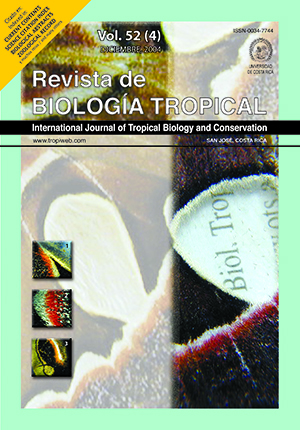Resumen
El roedor colonial Clyomys bishopi está aparentemente limitado a vegetación de semi-sabana (cerrado) en el estado de São Paulo, Brasil. El objetivo de este estudio fue verificar si la presencia de C. bishopi está asociada a la individuos de las palmeras Attalea gearensis, Syagrus loefgrenii y madrigueras de armadillos. El estudio fue realizado en la Estación Ecológica de Itirapina, en el sureste de Brasil. Treinta y seis cuadrantes fueron dispuestos en diferentes fisionomías del la vegetación del cerrado para encuestar el número de madrigueras de C. bishopi, árboles individuales de palma y madrigueras de armadillos. Se calcularon tablas de contingencia y correlaciones de Sperman para evaluar, respectivamente, la dependencia y asociación entre el número de madrigueras de C. bishopi y las otras variables. Se encontró una fuerte dependencia y asociación entre el número de madrigueras de C. bishopi y todas las variables medidas. Esto sugiere que este roedor alcanza grandes poblaciones cuando hay palmeras en abundancia. El uso de madrigueras de armadillos posiblemente facilita el movimiento de los roedores dentro de sus propias galeríasCitas
Avila-Pires, F.D. & M.R.C. Wutke. 1981. Taxonomia e evolução de Clyomys Thomas 1916 (Rodentia, Echymyidae). Rev. Brasil. Biol. 41: 529-534.
Cunha, M.J. & S.C. Belentani. 2000. Descrição das galerias de Clyomys bishopi (Rodentia, Echimyidae) p. 142- 152. In M.R.C. Martins, W. Mantovani, J.P. Metzger (orgs.). Livro da Disciplina Ecologia de Campo. Universidade de São Paulo, São Paulo. Brasil.
Giannotti, E. 1988. Composição florística e estrutura fitossociológica da vegetação de Cerrado e de transição
entre Cerrado e Mata ciliar da Estação Experimental de Itirapina (SP). Dissertation. Universidade Estadual de Campinas. Campinas. Brasil.
Mantovani, W. 1987. Análise florística e fitossociológica do estrato herbáceo-subarbustivo do Cerrado na reserva biológica de Guaçu e Itirapina. Ph. D. Thesis. Universidade Estadual de Campinas. Campinas. Brasil.
Nowak, R.M. 1999. Walker´s Mammals of the World. Volume II. The John Hopkins University, Baltimore and London. 1101 p.
Siegel, S. & N.J. Castellan-Jr. 1988. Nonparametric statistics for the behavioural sciences. McGraw-Hill, New York. 399 p.
Vieira, M.V. 1997. Dynamics of a rodent assemblage in a cerrado of southeast Brazil. Rev. Brasil. Biol. 57: 99-107.
Zar, J.H. 1984. Biostatistical analysis. Englewood Cliffs. 718 p.
##plugins.facebook.comentarios##

Esta obra está bajo una licencia internacional Creative Commons Atribución 4.0.
Derechos de autor 2004 Revista de Biología Tropical


